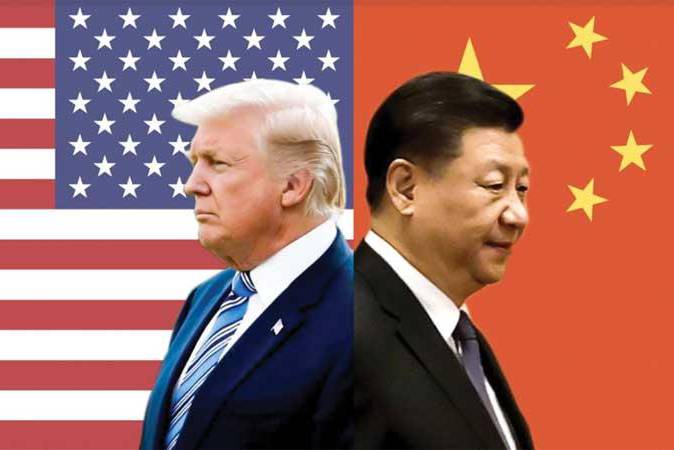The US-China trade battle and the disorderly Brexit will not go down well for Sri Lanka and many other developing economies across the world and is likely to enter a phase of recession due to the slower growth experienced by developed economies, economists said.
Growth in China, the second largest economy has been easing for years. Latest figures show China’s GDP grew 6.2 percent in the second quarter, the slowest since early 1990s. The trade war with the US which imposed tariffs on billions of dollars worth of Chinese goods is adding more strain on China and the US as well. Economists say for small economies trade with China is extremely important. The US, UK and the EU are major markets for Sri Lanka’s exports accounting for a larger share of the total exports.
Sri Lanka’s apparel exports to the EU by 2015 accounted for US$ 2.4 billion while exports from Vietnam to the region was US$ 3.9 billion. The EU reinstated the GSP Plus facility to Sri Lanka in 2017. Lakshman Kadirgamar Institute of International Relations and Strategic Studies, Executive Director Dr. Ganeshan Wignaraja said dark clouds hanging over the global economy could spell more bad economic news for Sri Lanka which is still in recovery mode following the Easter Sunday attacks.
He said this year and the next could see tough economic times for a small open economy such as Sri Lanka. However, the silver lining is the opportunity that exists to put in place a new economic agenda for inclusive growth after the cycle of Presidential and Parliamentary elections.
“An agenda for long-term growth would be needed to effectively manage macroeconomic imbalances and the debt overhang over the economy as well as gradually tackling challenging areas such as reforms to the labour market, agriculture and the public sector,” Dr. Wignaraja said.
Sri Lanka’s total foreign debt exposure up to 2022 is around US$ 14.9 billion which would impact the budget and trade deficit.
On the global front, Dr. Wignaraja said global stock markets seem jittery again with European stocks falling on Thursday due to fears of a global recession and a disorderly Brexit. The intensification of US-China trade tensions and rising debt levels in emerging markets have added to moves into less risky stocks and government securities. Are fears of another global recession overstated by the markets is the critical policy question today.
He said there is little doubt that the global economy is experiencing a phase of slower growth beset by heightened risks. But this is not new but rather a continuing shift to new world economy that came out of the global financial crisis of 2008-2009. Advanced Western economies are experiencing secular stagnation or a long-term economic slump.
“China is also slowing faster than expected and Indian growth looks tepid. These changes in the pattern of growth reflect structural factors like a lack of investment, not enough workers due to an aging population and disruptive technological change. The tit-for-tat tariff escalation between the US and China and the prospect of a disorderly Brexit have probably made matters worse,” Dr. Wignaraja said.
That said, the world’s central banks and finance ministries are watching the situation closely and still have some firepower for counter-cyclical policies. The International Monetary Fund and other international financial institutions are also gearing up. And there is some prospect of international policy coordination.
Professor in Economics University of Colombo Sirimal Abeyratne said the impact of the US-China trade war on Sri Lanka is more indirect than direct. There is no reason why our bilateral trade relations with these two countries get affected significantly. Besides our trade volumes are negligible from their point of view. However, the global impact of US-China trade friction would be negative, affecting each country. Depending on how much we are ready to accommodate the resulting export demand and import supply condition in both US and China, some countries such as Sri Lanka could benefits from the trade dispute.
No-deal Brexit means, the UK will have no agreement with the EU so that it will be like any other country in the world as far as the UK trade and investment relations with the EU are concerned. This is bad for the UK economy, because imports to and exports from the UK will be under WTO guidelines resulting in higher domestic prices and lower export demand.
Its impact on countries like Sri Lanka are two-fold. The weakening British Pound will have negative implications, but the potential weakening of the Sri Lankan rupee is much greater. Secondly, the UK has to adopt unilateral policies for further liberalization to compensate for the negative impact of the Brexit on the UK economy.
This means that actually, in the medium-term the UK economy would be in a better position and, that the countries in the rest of the world can improve their trade relations with the UK further.
The US-China trade war is casting a shadow over the world economy and warning signs of a looming downturn have flashes on financial markets according to reports
However, according to economists recession poses no immediate threat to larger economies in Asia although they are slowing down but smaller economies in the region are at risk.
The last quarter GDP growth in India slipped to a five-year low of 5.8 percent and Hong Kong, the Asian financial hub is hampered by the slowdown in China. Growth in Singapore, the trade dependent city state has been hit by weak global demand and the trade war.
Following repeated tariffs imposed by the US on Chinese goods, China last week slapped a fresh set of tariffs on US goods worth US$ 75 billion and the US retaliated with an additional five percent levy on Chinese goods.
(Sunday Observer)

